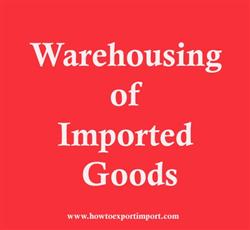Warehousing of Imported Goods
The facility of warehousing of imported goods in Customs Bonded Warehouses, without payment of Customs duty, is permitted under the Customs Act, 1962. In addition to that, the provision of the Warehoused Goods (Removal) Regulations, 1963 and Manufacture and Other Operations in Warehoused Regulations, 1966 are also applicable. Basically, goods after landing are permitted to be removed to a warehouse without payment of duty and duty is collected at the time of clearance from the warehouse. The law lays down the time period upto which the goods may remain in a warehouse, without incurring any interest liability and with interest liability.
 Warehousing Stations:
Warehousing Stations:
The warehouses are to be appointed/licensed at particular places only which have been so declared by Central Board of Excise and Customs. The Board has delegated its power for declaring places to be Warehousing Stations to the Chief Commissioners of Customs. In respect of 100% EOUs, the powers to declare places to be Warehousing Stations have been delegated to the Commissioners of Customs.
Storage Period of Warehoused Goods:
Any goods deposited in a warehouse may be stored upto a period of one year in the Bonded Warehouse. In the case of capital goods intended for use in any 100% EOU, such goods can, however, be stored up to a period of 5 years. The warehousing period can be extended by the Commissioner of Customs for a of 6 months and by the Chief Commissioner of Customs for such further period as is deemed fit by him. The importers should file their applications for extension well before the expiry of the initial/extended period of warehousing.
Before granting extensions, officers have to examine the condition of the goods to see that they are not likely to deteriorate during the extended period. A somewhat liberal approach in extending warehousing period in the following categories of cases is considered, if the interests of revenue are not likely to be jeopardized:
(a) Goods supplied as ship stores/aircraft stores.
(b) Goods supplied to diplomats.
(c) Goods used in the units operating under manufacture-in-bond scheme.
(d) Goods imported by 100% EOUs.
(e) Goods warehoused and sold through duty free shops.
(f) Machinery, equipment and raw material imported for building and fitment to ships.
Extensions in warehousing period are not meant to be granted routinely but only in such cases where the goods have to be kept in the warehouse under circumstances beyond the control of the importer. Lack of finance to pay the duty is not considered as valid and good ground of seeking extensions which are otherwise given for short period.
In case the warehoused goods are likely to deteriorate, the Commissioner of Customs may reduce the one year's period of warehousing to such shorter period as he may deem fit.
Rate of Interest on Customs Duty in case of Bonded Goods:
In Cases where the capital goods for 100% EOUs remain in a warehouse beyond a period of 5 years, interest at the rate of 24% per annum shalt be charged on the Customs duty payable at the time of clearance of the goods for the period from the expiry of the said warehousing period till the date of payment of duty. In the case of all other goods interest at the rate of 24% per annum is payable after the expiry of thirty days in the warehouse
Recovery of Duty on Bonded Goods:
Customs Officers may demand from the owner of bonded goods the full amount of duty chargeable on such goods, along with all penalties, rent, interest and other charges payable in the following cases:
(a) Where any warehoused goods are removed in contravention of the Customs Act, 1962;
(b) Where such goods have not been removed from a warehouse at the expiry of the period permitted under section 61;
(c) Where any warehoused goods have been taken under section 64 as samples without payment of duty; and
(d) Where any bonded goods have not been cleared for home consumption or exportation or are not duly accounted for to the satisfaction of the Customs.
In case the owner fails to pay the amount as demanded above, Customs may detain and sell, after notice to the owner, such sufficient portion of the bonded goods as may be selected.
Is Received for shipment Bill of Lading sufficient for LC negotiation?
Is Risk Management System (RMS) simplify import? What is RMS in import.
Is sales tax applicable on shipments effected under high sea sales
Is Seaway bill a document of title? What is Seaway bill.
Is THC same in all ports
KINDS OF LOSSES in Marine Insurance
Know the term Port of Discharge and Place of Delivery
LC advantage exporter
LC advantage importer
LC parties
LCL shipment booking tips
Letter of credit
Import General Manifest (IGM)
Importance of Bill of Lading
Introduction to this web site.
Is Airway bill a documents of title?
Is Customs House Agents (CHA ) required to be appointed mandatory?
Is DP terms of payment safe in export business?
Is Letter of Credit LC safe for an Importer?
Is ON BOARD CERTIFICATE required for LC negotiation
Maintain quality of goods - a prime factor in exports
Master collect House collect
How does Letter of Credit work?
How does STP units work in India?
How does TT (Telegraphic Transfer) work?
Master Collect House Prepaid
Master prepaid House collect
Master prepaid house prepaid
Material used for testing is eligible for Modvat
Mode of payments in international trade
Mode of transport under EX WORKS/FCA/CPT/CIP/DAT/DAP/DDP/FAS/FOB/CFR/CIF
MSDS Material Safety Data Sheet
What are the risks and solutions in Export Business?
Service Tax - Click here to read complete notification under Budget 2014
What is Bank post shipment credit to exporters?
Types of export containers
Measurement of export containers
Export Import Policy of India 2015-20
MEIS, Merchandise Exports from India Scheme
SEIS, Service Exports from India Scheme
Merge your Commercial Invoice and Packing List for all your future exports
Export procedures and documentation